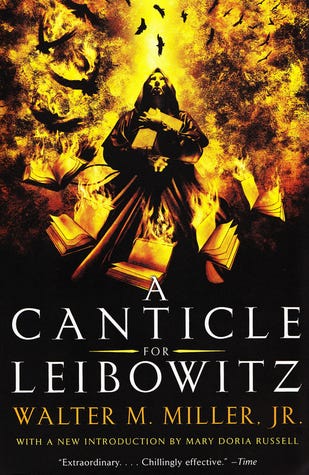Book Review: A Canticle for Leibowitz
One book I've been itching to review after reading it this summer is A Canticle for Leibowitz by Walter M. Miller, Jr. Because I wasn't entirely certain I could do it justice, I put it off so I could chew on it some more. I've decided I could chew on this one for years and may still have more to say about it, so I might as well do it now! (Just FYI- I'm intentionally vague in the review so as not to spoil any of the content for you.)

In the post-apocalyptic future predicated by nuclear war, a new dark age dawns over a ruined and desolate world. Violence, tribal barbarism, and hostility to knowledge reigns, but one dedicated group of cloistered monks seek to preserve, study, and rediscover science through the relics and writings of Saint Leibowitz.
Divided into three parts, the story traces the intensive and painstaking work of the monks of the Leibowitzan abbey throughout the ages. Seeking to find the knowledge of the past and save it, the monks constantly face dangers in its preservation, as well as the many evils of the outside world. Even with their sacrifices and slowly gained advances, is humanity doomed to repeat the mistakes that will ultimately usher its end?
Wow. In my opinion, A Canticle for Leibowitz is one of the most thought-provoking, haunting, and imaginative sci fi novels I've ever read. While I found the start of the story rather slow, the world Miller builds also built intrigue. After every page, I wanted to know more. Though well-versed and familiar with religious/biblical language, I did at times find myself pretty confused with the subtle references and interspersed Latin (even with 2 semesters of Latin under my belt!). I imagine a non-religious (heck, non-Catholic) reader could be pretty turned off by the allusions, but Miller succeeds in making post-apocalyptic Catholicism come alive. In fact, his expert command of such allusions and religious language is what makes the book-- through it he finds vivid ways to imagine the mundane minutiae of his characters' experience, as well as subverting the language for a humorous effect (even when dealing with morbid subjects). Furthermore, the language sets the theological framework necessary to understand his world and answer the difficult questions its darkness creates. With this in mind, Miller's writing is profound, cathartic, and often prophetic.
I also connected with Miller's characters. I rooted for Brother Francis, felt the weight of the world with Dom Paulo, and was amused by the Poet. I've never been more intrigued or puzzled by the Pilgrim/Benjamin/Old Jew character, who serves to tie all three parts together.
My only real complaint is the complex/cryptic nature of the plot, which isn't much of a complaint at all. Looking at some of the context and information about the author himself, the themes become more evident- but I did have to do some legwork. At any rate, the symbolism, motifs, and allusions help this work rise out of its genre and become so much more. I'm actually surprised I didn't encounter this in any of my plethora of English courses until a random (and new) elective in college. And even then, it was optional.
In this day and age, when the question of why humanity continues to come up with more creative and devastating ways to kill its members, A Canticle for Liebowitz feels timely and poignant. I invite you to read it- it may be the book you end up thinking about all year.



